Engineering work shop Lab
Engineering Workshop Lab is well equipped with all basic requirements of components. Beginning with the Industrial Revolution era, a workshop may be a room or building which provides both the area and tools (or machinery) that may be required for the manufacture or repair of manufactured goods. Workshops were the only places of production until the advent of industrialization and the development of larger factories.
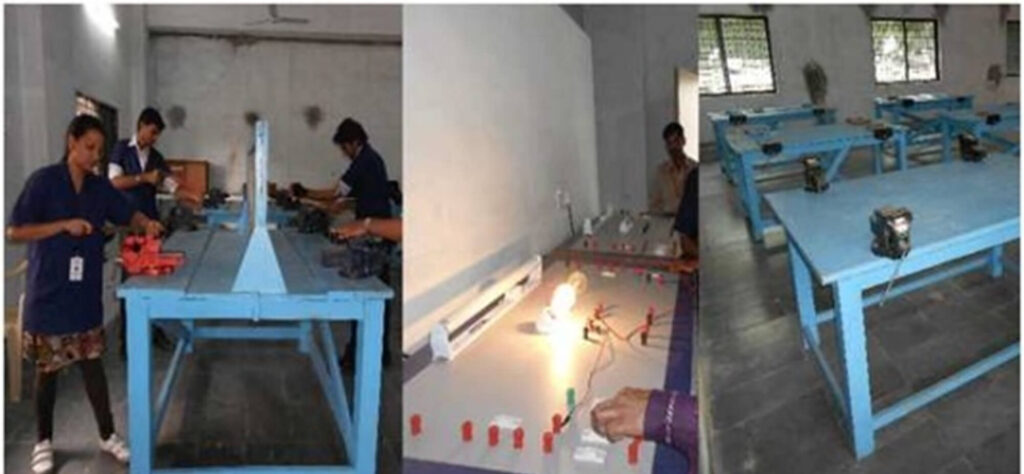
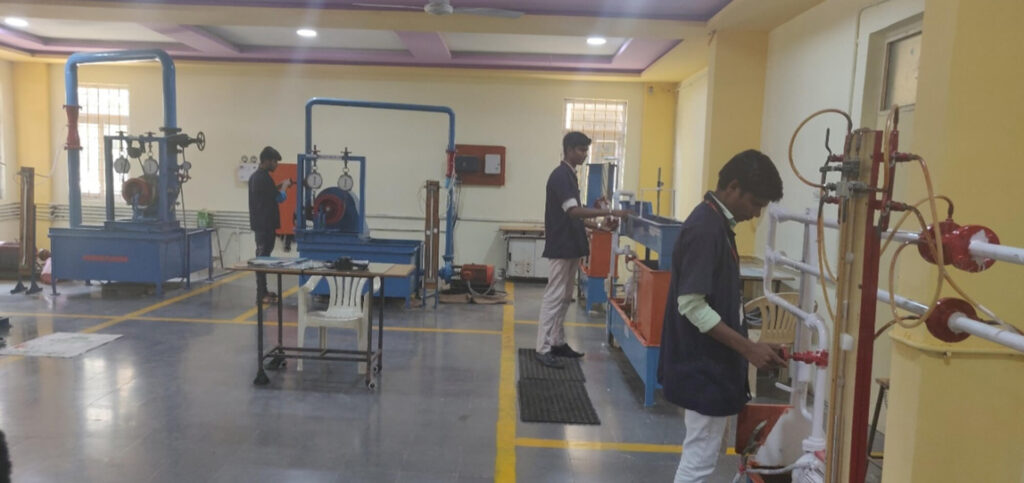
Fluid Mechanics & Hydraulic Machinery Lab
Fluid Mechanics & Hydraulic Machinery Lab is well equipped with all basic requirements of components. In hydraulics laboratory there is a range of experimental set-ups through which students are given a very good demonstration to understand the various methods of measurement of flow rates, capacity & velocity of water in tanks, closed pipes and open channels. In addition, in this laboratory, students get an experience to understand the fluid properties like surface tension, temperature, viscosity and they get a practical experience of measurement of these properties, which are very important for the selection of pumps, pipes and its specifications like material, size & slope. It is quite useful for design of drainage channels and open channel.
Computer-Aided Design and Computer-Aided Manufacturing Lab (CAD/CAM Lab)
CAD/CAM Lab is used to gain practical experience in handling 2D drafting and 3D modeling. This lab contains the features of CNC Machine and exposes students to modern control systems (Fanuc, Siemens etc.) This lab includes computers (i3 processor, 4 GB Ram, Standard Graphics Card, 1TB Hard Disk) with CAD/CAM software. The facility has been designed and structured to take care of professional through AUTODESK certification programs for students, consultancy for industries and to also carry out globally outstanding research. The CAD/CAM lab contains advanced software versions CAD/CAM/CAE/CFD.
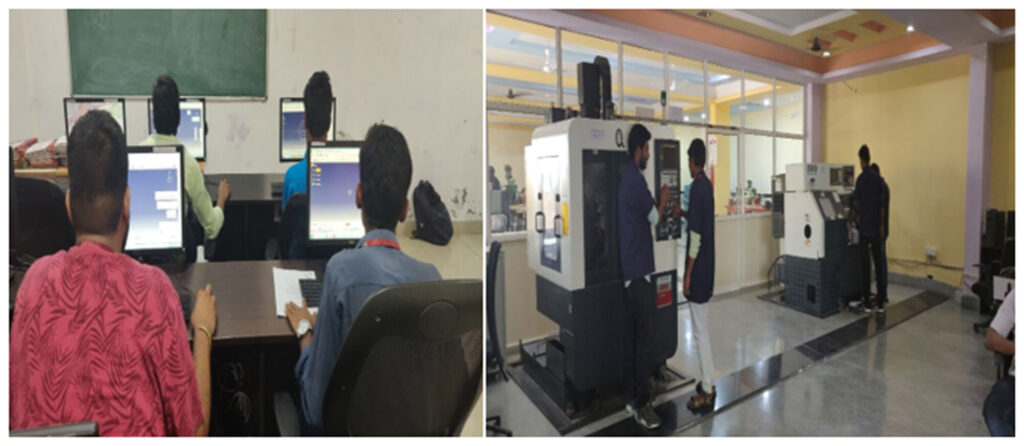
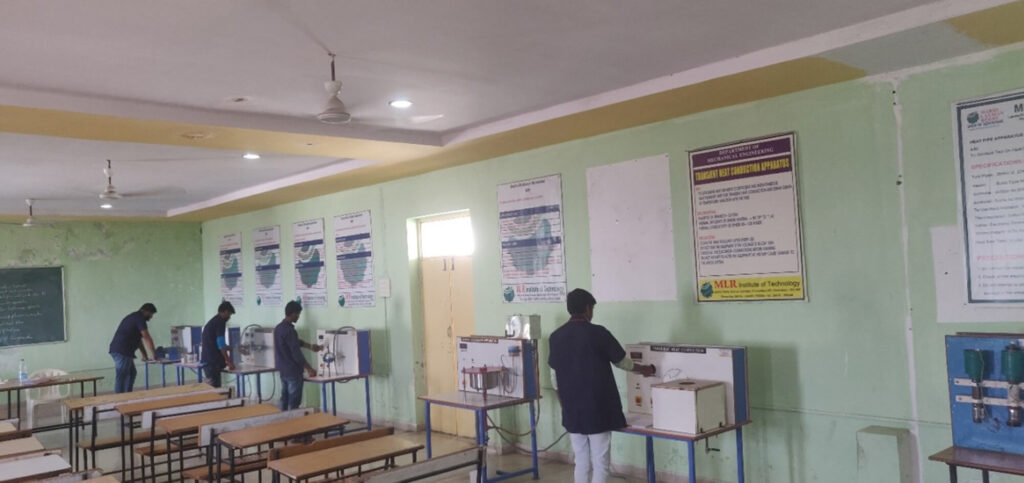
Heat Transfer Lab
The experiments conducted in the heat transfer lab help the students to understand all the three modes of heat transfer, namely conduction, convection and radiation practically. These experiments also pave way for inculcating certain innovative skills in the students making them to use the above experimental setups as starting point to take up higher level experimental studies in Heat Transfer.
Thermal Engineering Lab
The primary purpose of the laboratory ‘thermal engineering’ is to show students the experimental methods on thermal energies on various engines and demonstrate their operational procedures. These values can be further used to determine other fuel properties. In order that students have a fairly good understanding of the theory underlying the experiments, the entire course is designed such that classroom lectures precede lab work.
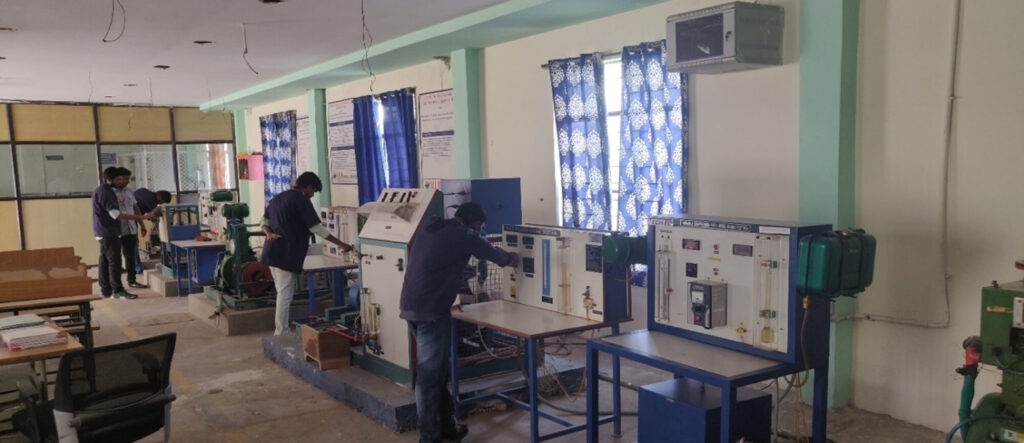
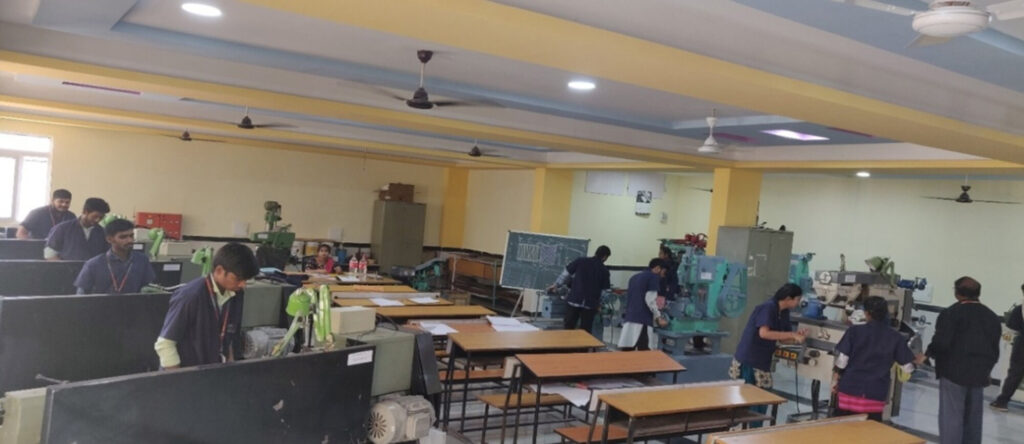
Machine Tools Lab
Machine Tools laboratory is aimed at providing an introduction to the Know-how of common processes used in industries for manufacturing parts by removal of material in a controlled manner. Auxiliary methods for machining to desired accuracy is covered. The emphasis throughout the laboratory course will be on understanding the basic features of the processes rather than details of constructions of machine, or common practices in manufacturing or acquiring skill in the operation of machines.
Production Technology Lab
Production Technology lab encompasses Metal casting, Welding, Press working and processing of Plastics. It inculcates knowledge and skill to the students starting from preparing a wooden pattern to completion of a casting which also comprises different Sand testing techniques. Also, students can understand broadly Welding and press working skills employed in Industries. & analyze the different manufacturing process and their use in industry for component production
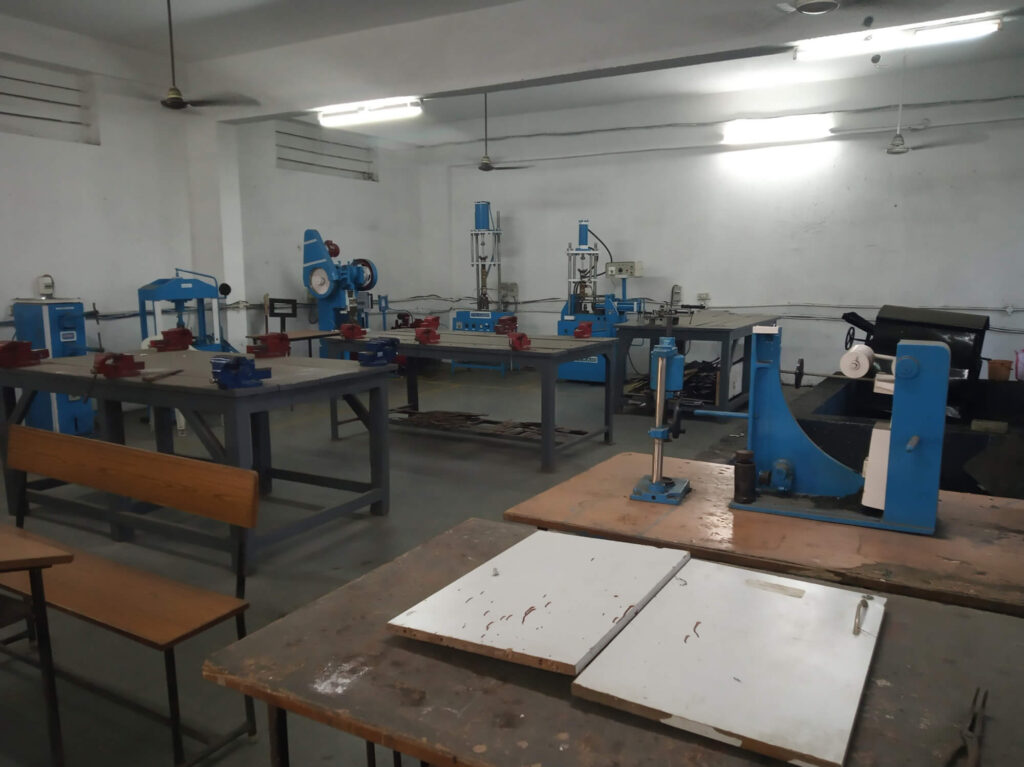
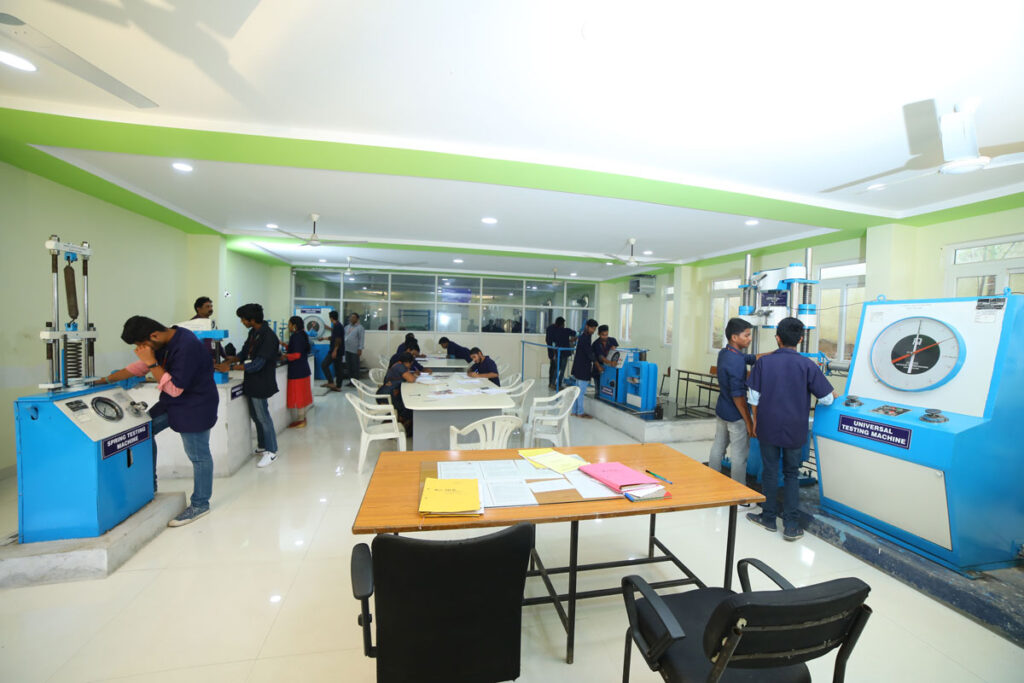
Mechanics of Solids lab
In this laboratory, students will have the opportunity to apply loads to various materials under different equilibrium conditions. The student will perform tests on materials in tension, compression, torsion, bending, and impact. These conditions and/or constraints are designed to reinforce classroom theory by having the student perform required tests, analyze subsequent data, and present the results in a professionally prepared report. The machines and equipment used to determine experimental data include universal testing machines, torsion equipment, spring testing machine, compression testing machine, impact tester, hardness tester, etc. Data will be collected using Dial indicators, extensometers, strain gages and strain indicator equipment, as well as load and strain readouts on the machinery and graphing capabilities to print relevant plots for analysis.
Instrumentation and Control Systems Lab
Instrumentation is the development or use of measuring instruments for observation, monitoring or control. An instrument is a device that measures a physical quantity, such as flow, temperature, level, distance, angle, or pressure. Instruments may be as simple as direct reading hand-held thermometers or as complex as multivariable process analyzers. Although instrumentation is often used to measure and control process variables within a laboratory or manufacturing area, it can be found in the household as well. The control of processes is one of the main branches of applied instrumentation. Instruments are often part of a control system in refineries, factories, and vehicles. Instruments attached to a control system may provide signals used to operate a variety of other devices, and to support either remote or automated control capabilities. Students will also be able to measure and calibrate physical quantities like pressure, temperature, speed, displacement, flow, and vibration in real time engineering applications using transducers with amplification circuits.
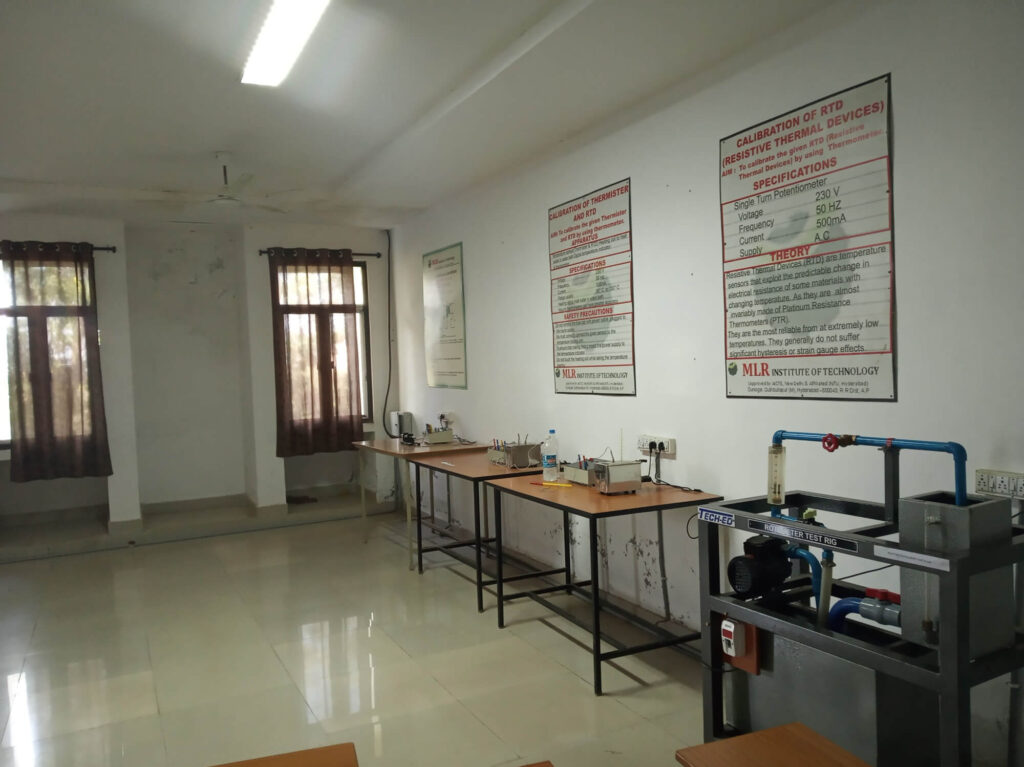
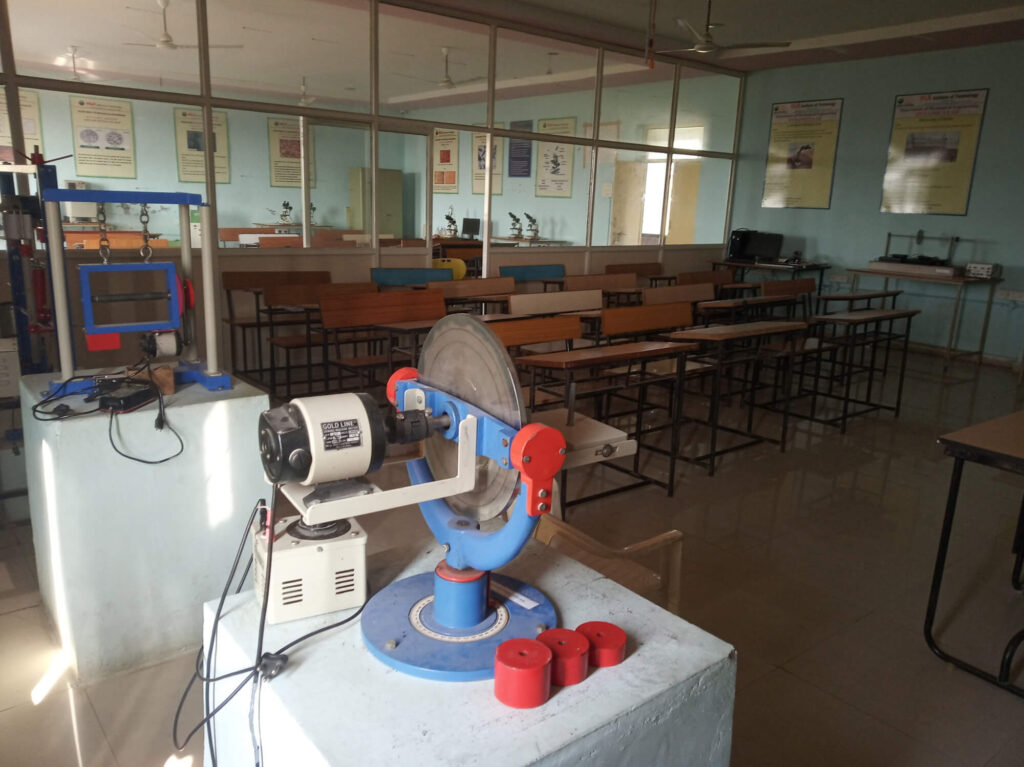
Dynamics of Machines Lab
In this laboratory, students will have the opportunity to understand and analyze the balancing of machine parts statically and dynamically. The dynamic behavior of moving objects will also be analyzed. The basic mechanisms for mobility and forces that are acting, analyse and synthesise the machines.
Metallurgy and Material Science Lab
Metallurgy involves studying the physical and chemical properties of metallic elements and their alloys, which are combinations of different metallic elements. Metallurgical labs contain high tech equipment to perform important tests. Some of these tests include: failure testing, corrosion testing, chemical analysis, fatigue testing, metallography, and weld testing.
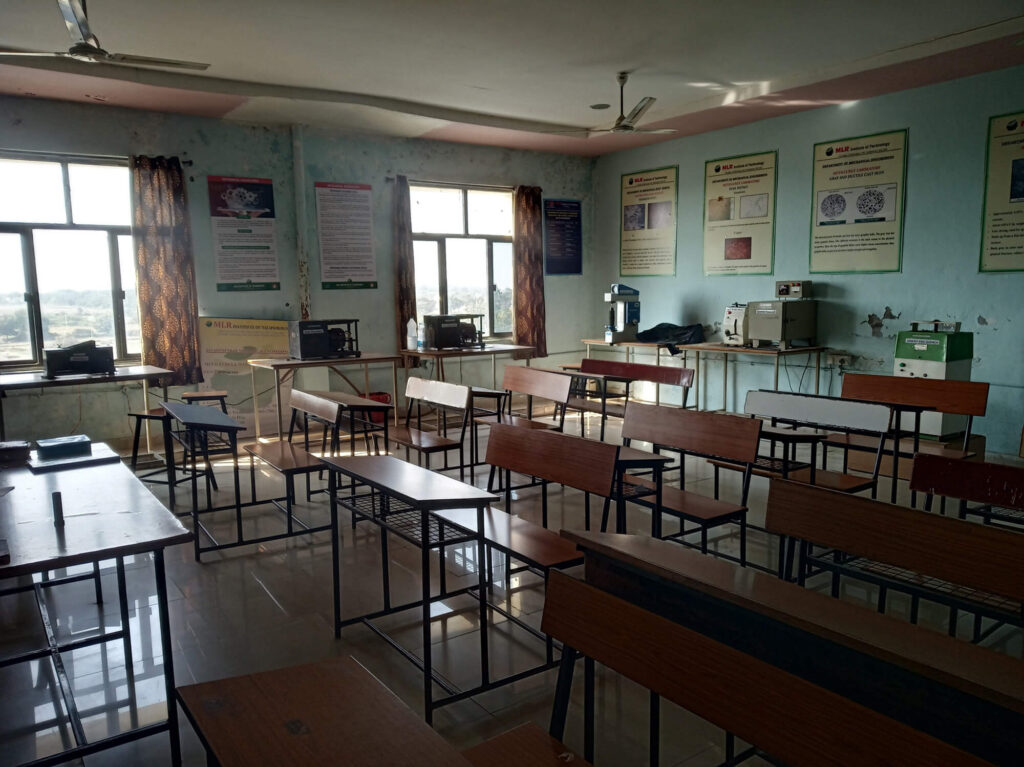
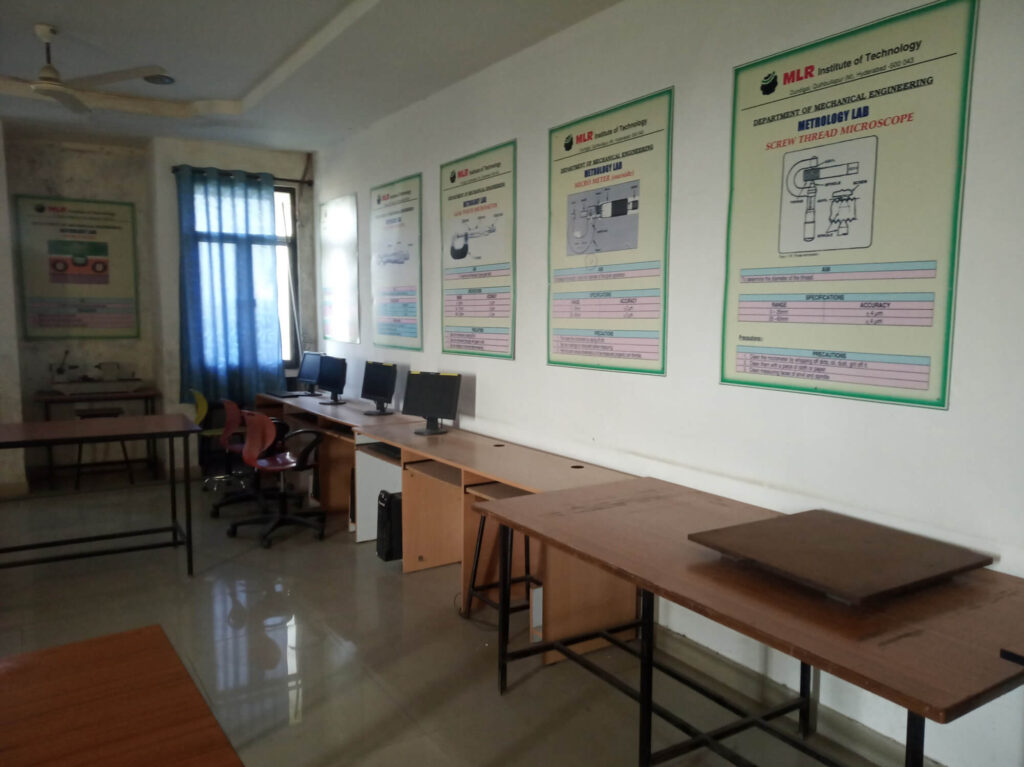
Metrology and Measurement Lab
You can’t manage what you don’t measure”, Metrology Laboratory goes with this saying. Metrology is the science of measurement. Testing is the technical procedure consisting of the determination of characteristics of a given object or process, in accordance with a specified method. The laboratory is to equip students with knowledge on common linear and angular measuring instruments meant engineering measurements. In science and engineering, objects of interest have to be characterized by measurement and testing. Measurement is the process of experimentally obtaining quantity values that can reasonably be attributed to a property of a body or substance.
Composites Lab
The Composite Materials Laboratory includes facilities for manufacturing, characterization and modeling of advanced composites and nanostructured materials. The Composite Materials Laboratory is well equipped with furnace, Bottom pouring type stir casting machine, Digital Ultrasonic Flow Detector, Barcol Hardness Tester
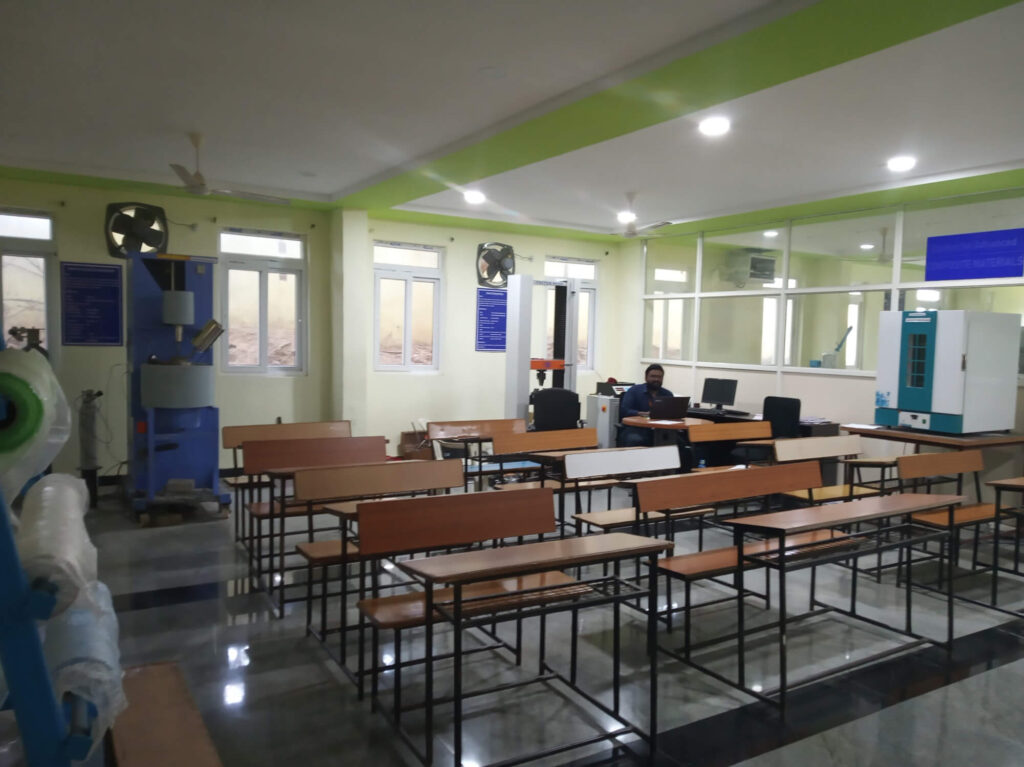
Center of Excellence – Digital Manufacturing:
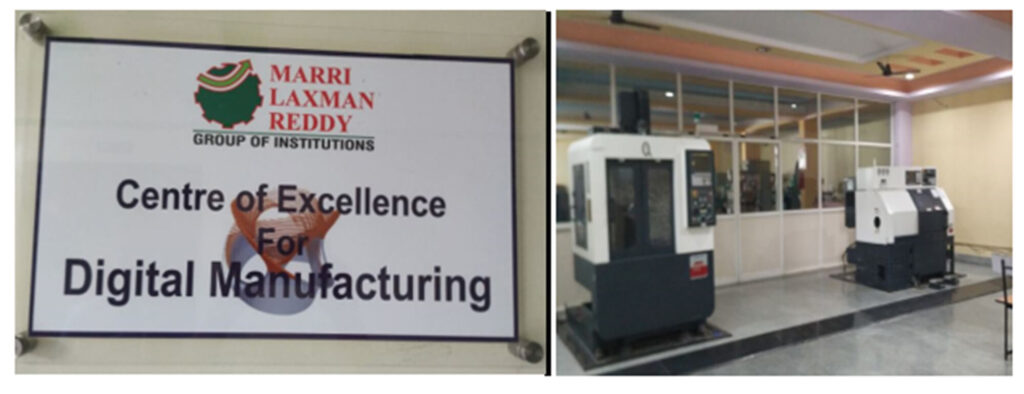
Objective:
To provide the basic and advanced features of manufacturing techniques such as CNC machining and additive manufacturing and to motivate the students and faculties to undertake research and consultancy projects in digital manufacturing.
Outcomes:
- Students will be able to model any 3D component that requires precision manufacturing in the field of Mechanical and Aerospace engineering.
- Students will become more familiar with making of complex components using digital manufacturing techniques which are required for industries.
- Research publications by students and faculty.
- Improved industry interaction through consultancy projects.
Scope of COE:
This COE can be extended to carry the consultancy work which fulfills the need of small and medium scale industries. The students can fabricate prototype models for their research projects.
Major Resources Available:
- CNC Lathe
- CNC Drill Tap machining center (CNC Mill)
- 3D Printer (Ultimaker 2) with Cura software
- CADEM Software – 5 users
Center of Excellence – Product Life Cycle Management
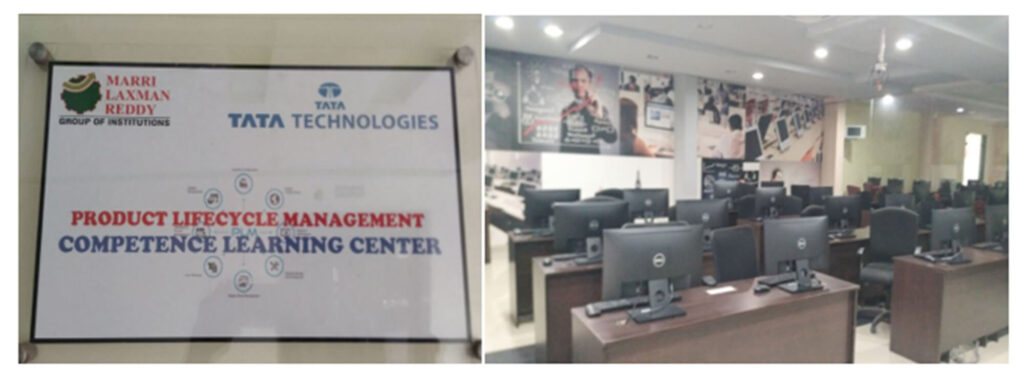
Objective:
To inspire sustainable thinking across the entire product lifecycle, representing an all-encompassing vision for managing data relating to the design, production, support and ultimate disposal of manufactured goods
Outcomes:
Students are able to list, justify and interpret productivity models in Manufacturing and service organization. Understanding of manufacturing resource to predict and control the quality of an end product.
Scope of COE:
Provides the knowledge about how a Product Lifecycle Management system (PLM) is used to structure and manage the information which guides the product during its lifecycle.
Major Resources Available:
- ENOVIA by Dassault Systemes
- WINDCHILL by PTC
Center of Excellence – Advanced Composite Materials

The Department of Mechanical Engineering has Advanced Composite Materials Laboratory and it is well equipped with furnace, Bottom pouring type stir casting machine, Digital Ultrasonic Flow Detector, Barcol Hardness Tester. The students are using this laboratory for preparation of different combination of composite and hybrid materials. COE focus on consultancy work for small and medium enterprises for Industry Level Project and also helps the students to understand the various characteristics of composites and fabricate models for their research projects.
SAE (Society of Automotive Engineers) Workshop
The Department of Mechanical Engineering has SAE (Society of Automobile Engineers) Workshop and it is well equipped with Windchill Tig Welding, Arc Welding, Lathe, Portable metal cutter, Drilling Machine etc. The facilities like welding, cutting are used by the students for fabrication and development of the vehicle for various competitions.
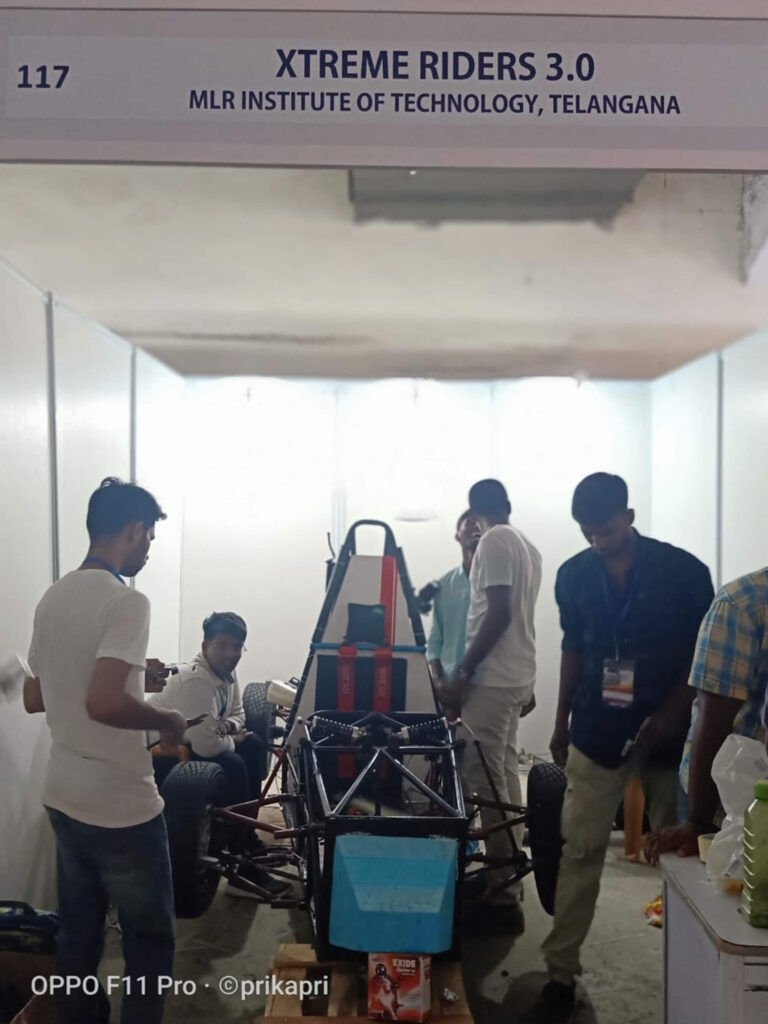
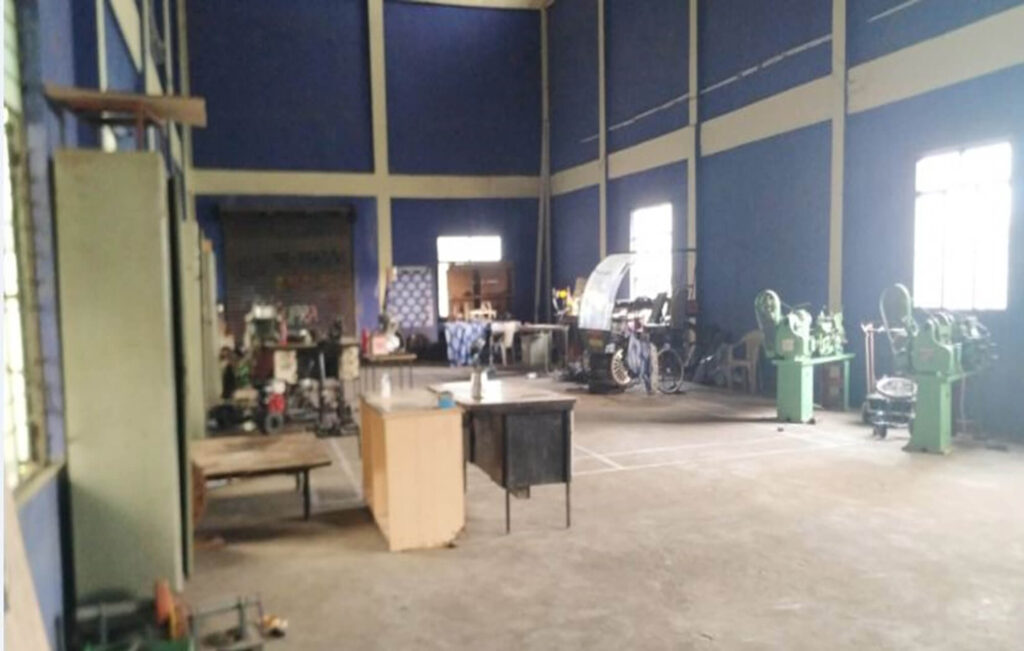
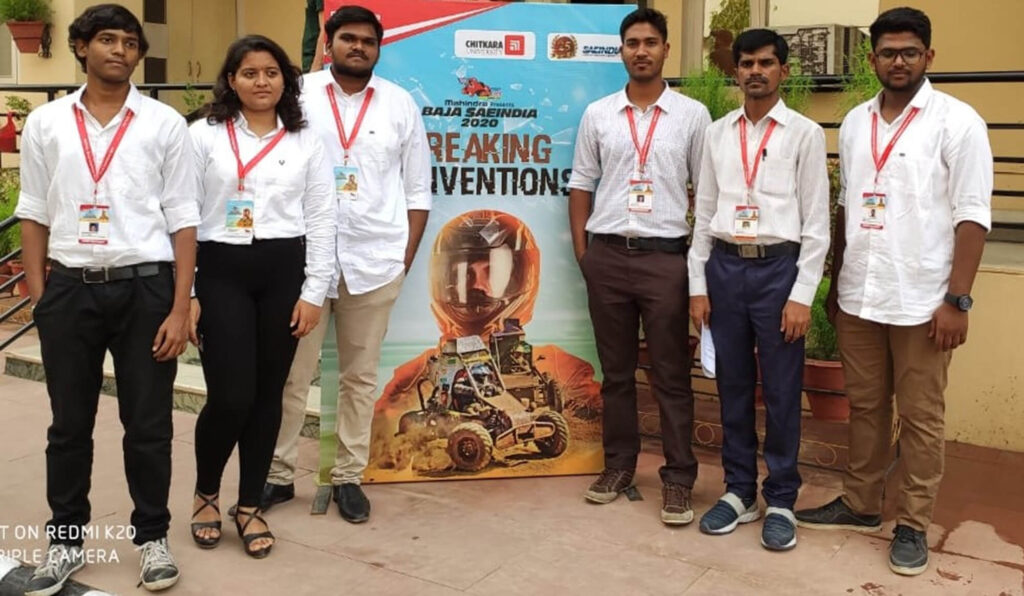
Center of Excellence – Computational Engineering by Dassault Systems
The Department of Mechanical Engineering has well equipped computational facility with a Center of Excellence for Computational Engineering by Dassault Systems CATIA V5R18. We carry out computational projects under this facility in preparation modeling, analyzing and interpreting data. We also validate the acquired computational results with theoretical approaches in student Projects. Our staff members utilize this computational facility to carry out their research work, projects which are presented at National & International Conference, and published in International Journals.

